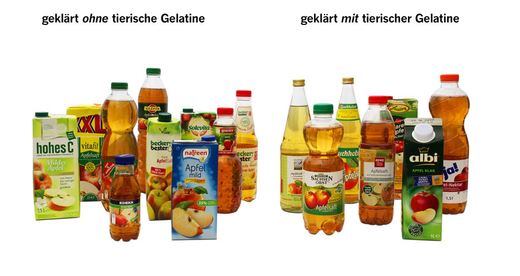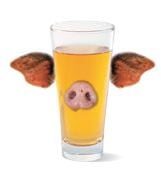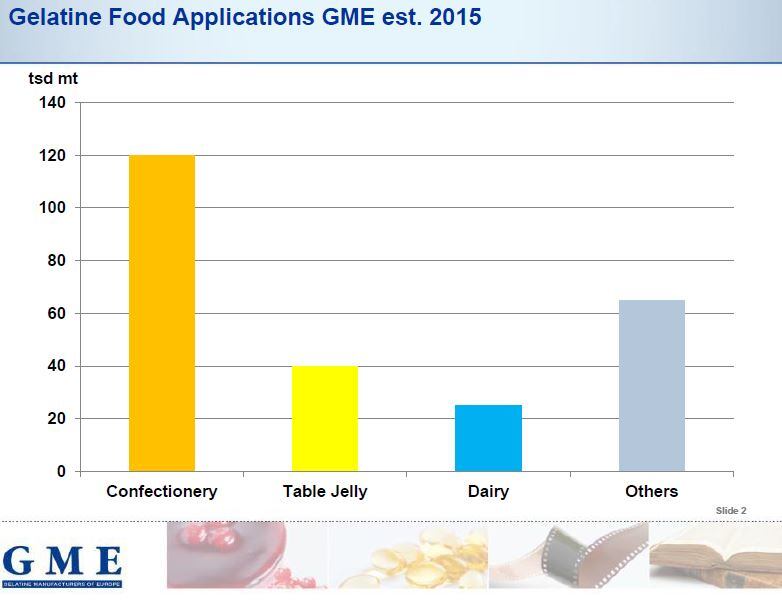Gelatine is used as a clarifying agent in juice manufacturing and is considered a processing aid. Under the EU's Food Information to Consumers (FIC) legislation, processing aids do not have to be declared on food labels because, in theory, they are absent from the final product.
But Foodwatch is demanding the compulsory labelling for all foods and beverages that contain animal-derived substances or were manufactured using them, including processing aids, additives and flavourings.
It has launched a campaign, which rounds up examples of juices that contain the hydrocolloid and others that are gelatine-free, and an online petition which so far has received over 130,000 signatures so far.

Head of the campaign Sophie Unger said: “We demand regulation by law. Of course, EU regulation would be the best, but as long as the Commission does not take action, our national politicians should do so. This is why the petition is aimed at our responsible minister of nutrition and agriculture, Mr. Christian Schmidt, and also the respective ministers of all German federal states.”
Voluntary practices, such as labelling a juice as vegan or vegetarian are insufficient, she added, because consumers would not expect animal-derived ingredients in a product like juice, and so would not look for a vegan or vegetarian logo.
A spokesperson for industry group Gelatine Manufacturers of Europe (GME) said: “To clarify a juice the fine particles and turbid materials need to be removed. Gelatine binds these particles: it reacts with polyphenols - tannins - and forms a precipitate which can be easily separated and removed [from the juice]. It is just an aid to get rid of the fine particles and turbid materials, not an additive.”

Gelatine can also be considered a clean label ingredient, the GME spokesperson added: it is derived from an ingredient of natural origin, is not chemically modified, contains no additives or flavourings and has been used for over 2000 years.
Reactions
Foodwatch contacted the different companies for feedback and received, what it called, “bad excuses”, with companies saying they used gelatine because it was a traditional method; that the information was available on the product’s website or that they had received no ingredient information from their own suppliers.
Other companies told FoodWatch they were aware of the issue. One such company was German beverage company Adelholzener.

A spokesperson for the company told FoodNavigator: “For being one of Germany’s leading mineral springs we constantly are working on offering the most possible variety of products to our costumers.
Due to this instance we certainly are aware of our clients‘ different types of diets. Our goal is to provide the most suitable product for every single costumer.
“Therefore, we prefer to cooperate with innovative suppliers who specifically are working on new forms and terms of beverage processing. One of our suppliers is actively working on the development of [the] possibility to clarify juice without the use of animal based products.“
As the development process is ongoing Adelholzener could not give any details as to which alternatives it was investigating, but said it had been looking into replacing gelatine with plant-based alternatives prior to the Foodwatch campaign.
FoodNavigator contacted manufacturers of plant-based gelatine alternatives about their functionality but received no reply.
Food manufacturers have come under fire for traces of processing aids present in the final product, or for using them for unauthorised reasons, such as using hydrogen peroxide to make seafood seem whiter (and therefore fresher) rather than for bacteriostatic reasons.
Nor is this the first time the issue of gelatine in juice production has attracted consumer interest.
In 2014 Australian Hindus were angered by Heinz’s use of beef-derived gelatine and alcohol as processing aids in its Golden Circle and Original Juice Co ranges.
Sources of food-grade gelatine are pigskin, bovine hide, pig and bovine bones and fish skin. Halal and kosher varieties are available, said GME.
Foodwatch said the petition will run until its demands are met.
